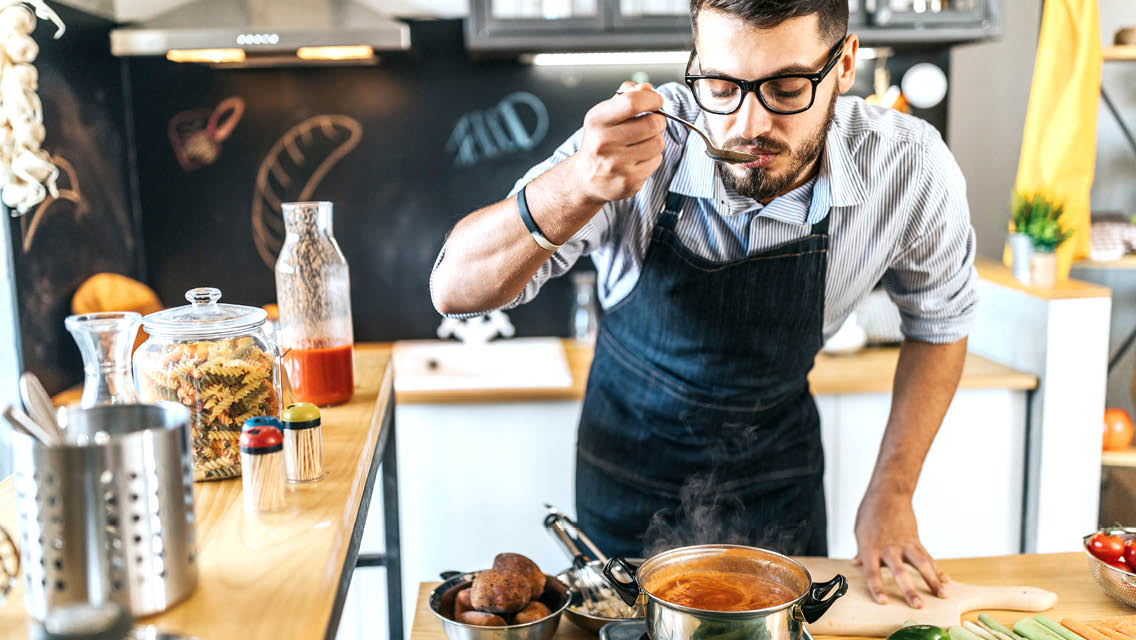Meals is a delight to the senses — all the senses. Style, after all, but additionally attractive aromas, the feel of meals in your tongue, the hiss of elements hitting sizzling oil, the attractive shade of completely cooked greens.
Though consuming a dish is at all times a sensory expertise, it’s straightforward to neglect that participating our senses whereas we’re cooking unlocks a wealth of data — way more than merely following a recipe and hoping for the greatest.
An immersive strategy can remodel your skills as a house chef, whether or not you’re an occasional prepare dinner otherwise you get away the pots and pans each night time. It could possibly open the door to creating dishes tailor-made to your personal palate and provide the confidence to experiment extra freely within the kitchen.
Contemplate these concepts for participating and embracing your senses to create memorable meals.
Sight
For those who’re starting your journey of studying to prepare dinner by sense, recognizing visible cues is an excellent place to start out.
- A look at a pan can let you know if you happen to want kind of oil, butter, or ghee. “Let your eyes, ears, and style buds information in how a lot fats you employ,” writes chef Samin Nosrat in her e-book Salt, Fats, Acid, Warmth. “Say a recipe asks you to prepare dinner two diced onions in 2 tablespoons of olive oil. In a small pan, that is likely to be sufficient to coat the underside, however in a bigger pan with larger floor space, it in all probability isn’t. As a substitute of simply following a recipe, use your widespread sense, too.”
- When sautéing onions, watch them flip from opaque to translucent as they sizzle. It’s a much more dependable technique than the imprecise “5 to seven minutes” instruction you typically encounter in recipes.
- Your eyes are glorious instruments for figuring out how massive or small to cut elements, which in flip informs how lengthy they’ll have to prepare dinner.
- Watch the colour of elements change whereas they’re cooking. Search for wealthy golden browns, whether or not you’re making zucchini fritters or roasting a rooster. This will let you know when meals is completed or when issues have progressed sufficient so that you can transfer on to the following step in your recipe.
Style
There may be nothing extra vital in cooking than honing your style buds, says chef Christine Ha, the primary blind contestant to win MasterChef. “Meals is most pleasing when every thing is balanced and harmonious,” she explains. And the one strategy to know for certain is by tasting your meals as you prepare dinner.
- Dip a spoon right into a pot of curry because it simmers. Does it want extra salt? Is there sufficient spice? Your efforts ought to yield a meal whose parts improve one another to ship beautiful texture and balanced taste.
- With regards to style, a bit distinction can go a great distance. Add loads of crunchy greens to a noodle stir-fry, or a splash of vinegar to a honey glaze — juxtaposition might be the lacking notice that turns your dish right into a symphony.
- Tasting sure meals can point out doneness. Nibble the top of a spaghetti strand to know when it’s completely al dente, or pattern a soup to discouragemine if it’s diminished sufficient.
Scent
The aromas of cooking don’t simply work up your urge for food and play a task in the way you style your meals: Additionally they provide important clues through the cooking course of. Typically you odor burning earlier than you see it, particularly if you happen to’re roasting meat or toasting nuts.
- Many elements — like garlic, ginger, and recent turmeric, as an illustration — change into extra fragrant as they prepare dinner, which normally means it’s time to maneuver on to the following step. Dry-roasting complete spices releases their fragrant compounds, including extra taste to a dish. The heady perfume rising from the skillet tells you they’re able to be floor. Butter takes on a wealthy, nutty aroma when it’s browned. When cooking with wine, you’ll have the ability to odor when the alcohol has burned off.
- When whisking collectively a seasoned coating for fried rooster or fish, you need to have the ability to odor the elements combined in with the flour. This additionally works whenever you’re seasoning meatballs or making falafel — examine for the scent of recent herbs and aromatic spices. If it doesn’t odor flavorful, make changes.
- Barring apparent indicators like mould, your olfactory sense is your first line of protection in gleaning whether or not elements are off. If a fast whiff says one thing doesn’t odor proper, compost it. On the flip aspect, smelling recent fruit is among the greatest methods to gauge ripeness.
Contact
You would possibly really feel a bit delay by dealing with your meals, however contact is a intelligent method to determine the doneness of meat or the freshness of produce. Get your fingers in there and really feel what your meals has to say.
- Decide up a tomato, bell pepper, or plum: They need to be agency however not exhausting to the contact.
- Whilst you gained’t wish to stick a finger in a simmering pot, stirring and feeling the thickness of a sauce through the resistance towards a spoon can point out it has diminished sufficient.
- Hover your hand over a wok to know when the pan is sizzling sufficient to start out frying.
- You can even use the contact check to examine if meat is cooked via. First, calm down your hand and press the fleshy space of your palm instantly under your thumb. That is how uncooked meat feels. Subsequent, contact your thumb and pinky finger collectively — the identical a part of your palm under your thumb could have the identical firmness of well-done meat. Thumb to ring finger and thumb to center finger are medium and medium uncommon, respectively.
Sound
Take heed to the pan scorching. A dry sound means you’ll want to add one other splash of oil to the pan; an excessive amount of noise might imply you’ll want to decrease the warmth. Sound additionally lets you realize in case your pot is about to boil over or when all of the liquid has cooked off.
- You’ll be able to hear when the moisture has cooked off your tofu or meat, which is an indication that it’s change into crisp. When it’s able to flip, the sound will shift from moist effervescent to a dry hiss.
- The crunch of lettuce or sharpness of celery or an apple signifies it’s recent.
- Tapping the underside of a freshly baked loaf of bread and listening for a hole sound lets you realize when it’s cooked via, cooled, and secure to slice. Slicing into the loaf earlier than it sounds hole will depart you with gummy, dense bread.
Instinct
When you grasp relying in your 5 senses within the kitchen, you open up the door to a sixth sense: instinct. You’ll develop the boldness to deviate from recipes and make your personal mouthwatering creations. Consider it like an improv comedy present as a substitute of a scripted sitcom.
- Through the use of your 5 senses, you’ll develop a knack for realizing which elements play nicely collectively. Conjure up flavors in your thoughts to make inventive pairings, like a sprinkle of smoked salt over recent tropical fruits.
- Take heed to your intestine when looking for elements. Possibly a recipe requires lettuce and the choices on the market look wilted. Depend on your instinct to resolve what to make use of as an alternative. That crimson cabbage might be a stupendous swap!
- Delve into your creativeness to concoct fabulous recipes with nothing greater than what you could have readily available.
“Meals is a multisensory expertise,” Ha says, “so using all of your senses to evaluate your meals will assist make a greater dish.” And it’s inside everybody’s attain. Immerse your self within the cooking course of, and with a bit trial and error you’ll be able to create meals that may outshine something yow will discover in a cookbook.
This text initially appeared as “Prepare dinner With Your Senses” within the June 2021 difficulty of Expertise Life.







